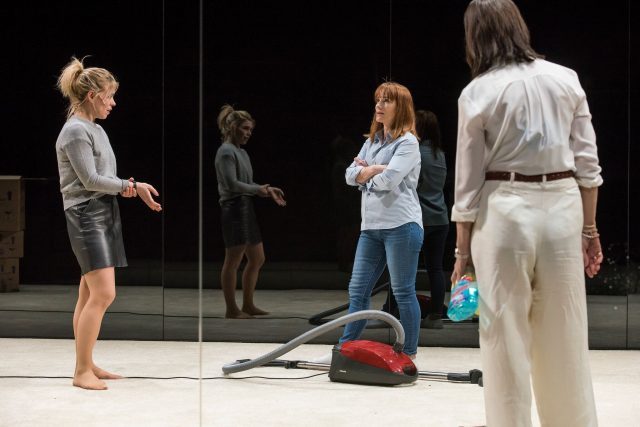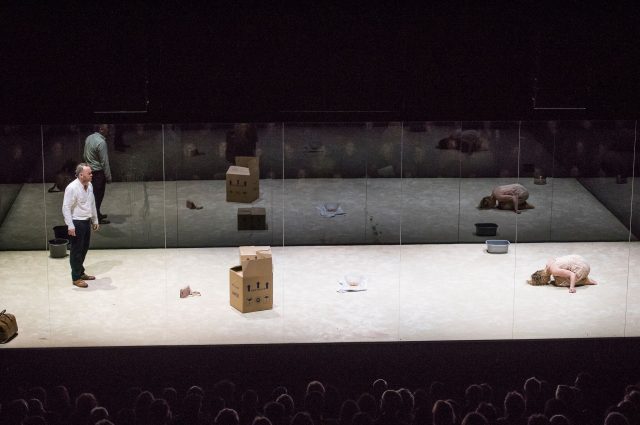
An unnamed woman (Billie Piper) and her partner (Brendan Cowell) consider starting a family in Simon Stone’s sizzling Yerma (photo by Stephanie Berger)
Park Ave. Armory, Wade Thompson Drill Hall
643 Park Ave. at 67th St.
Monday – Saturday through April 21, $40-$135
212-933-5812
www.armoryonpark.org
Australian director Simon Stone puts domesticity and obsession under a microscope in the blistering, no-holds-barred Yerma, which opened last night at the Park Avenue Armory. His adaptation of Federico García Lorca’s radical 1934 drama, part of the Spanish poet and playwright’s seminal Rural Trilogy that also includes Blood Wedding and The House of Bernarda Alba, digs deep into the heart and soul of a woman who wants to have a baby but is having trouble conceiving. In a coproduction between the armory and the Young Vic, Stone moves the play to modern-day London, where a thirty-three-year-old blogger identified only as “her” (Olivier Award winner Billie Piper) and her forty-three-year-old partner, international businessman John (Brendan Cowell), have just bought a three-floor apartment. At first the couple is deliriously happy with their life, thrilled to be free of bourgeois expectations, when the woman suddenly and surprisingly decides she wants to have a baby, but John’s enthusiasm is questionable. They have difficulty conceiving, and soon all kinds of connections to sex and reproduction appear, from her pregnant sister, Mary (Charlotte Randle), married to a philanderer, to a former boyfriend, Victor (John MacMillan), now father of a two-year-old, who gets a job at her office. Her twenty-one-year-old assistant, Des (Thalissa Teixeira), talks about her extremely active sex life while the woman’s mother, Helen (Maureen Beattie), can’t stop complaining about raising kids. In none of the situations is having children and being a parent ideal; instead, each person faces their own demons. Over several years, as the woman battles infertility, she descends into an ever-more-difficult struggle to maintain balance in her life as madness threatens.

Two sisters (Billie Piper and Charlotte Randle) evaluate their situations while their mother (Maureen Beattie) looks on in Park Ave. Armory production (photo by Stephanie Berger)
Yerma unfolds on Lizzie Clachan’s spectacular stage, reconfigured specifically for the massive fifty-five-thousand-square-foot Wade Thompson Drill Hall, which has previously been transformed in dazzling ways for productions of Eugene O’Neill’s The Hairy Ape, Matt Charman and Josie Rourke’s The Machine, and Rob Ashford and Kenneth Branagh’s Macbeth, among other plays, art installations, and music events. The audience is seated on risers on two sides of the stage, a horizontal space encased by glass, making everyone a voyeur peering into someone else’s personal life, as if turning the woman’s blog into a physical reality. The woman is trapped within the glass structure, which evokes her mind; she is the only one who ever makes contact with the walls, except for when her mother washes it early on, not wanting to get involved too much in her daughter’s problems. Each side of the audience can see the other through the glass; at first it looks like it could be a reflection, but it’s not, equating everyone, as if the story we’re all experiencing could be happening to any one of us.
At certain angles, the actors are reflected multiple times; thus, it is often possible to see four or five ghostly, unformed versions of Piper, visible far off to the right and left and across to the other side of the audience. It is a powerful dramatic effect that makes her deepening issues that much more universal. The lightning-fast set changes by lighting designer James Farncombe occur in sudden blackness as magisterial arias echo loudly throughout the space and a monitor announces the next chapter, which have such names as “Conception,” “Disillusion,” and “Deception,” followed by phrases both descriptive and ominous. In addition, the characters are mic’d in such a way that their voices seem transcendent as they echo above them. (The gorgeous music and sound design is by Stefan Gregory.) It’s a testament to Stone and the exceptional cast that they do not let the complex staging overwhelm the intimacy of the story. Nothing is done simply for show or to merely revel in the magic of theater; every aspect of the production has been ingeniously crafted to organically intersect into a wholly involving and shattering experience that will leave you physically and emotionally exhausted as well as thoroughly exhilarated.

A couple’s relationship evolves and devolves in Yerma at the Park Ave. Armory (photo by Stephanie Berger)
In her North American stage debut, Piper (The Effect, Treats) is electrifying as her character devolves from a fun-loving, sexy, multifaceted woman into a mental wreck falling into the lower depths of the human condition; it is a brave, bold, unforgettable performance that leaves it all out on the stage and on the glass, literally and figuratively. Cowell (Life of Galileo, The Dark Room) marvelously complements her as John, maintaining the mystery behind the man’s fears and desires as he reacts to his partner’s gut-wrenching unpredictability. As a collective unit, the cast displays the wide range of emotions associated with pregnancy, from conception, the morning after pill, and abortion to motherhood, postpartum depression, and separation. It never lets up for a second throughout its one hundred minutes, with no detail extraneous; an early discussion of a certain sexual position only later lends insight into John’s unspoken feelings about potentially becoming a father, and even the characters’ names have been carefully chosen, with biblical and historical references or descriptions of who they are and what they want. And yet Toneelgroep Amsterdam veteran Stone (The Wild Duck, Miss Julie) has opted to not call the woman “Yerma” even though that is the title of the play — the name is shouted out only once in Lorca’s original — emphasizing her lack of identity without a child while reminding us again that she is us. It’s a terrifying prospect, brought to life in this stunning, brutal production.